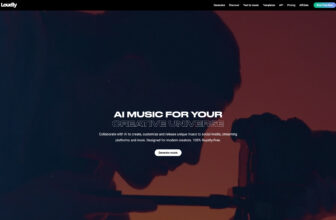AIVA

AIVA (Artificial Intelligence Virtual Artist) is one of the more established names in AI-powered music composition. Founded in 2016 in Luxembourg, it even has the distinction of being the first virtual composer recognized by a music rights organization (SACEM), which gives it some real credibility in the industry.
€11/mo | Pro €33/mo
Our Verdict
What is AIVA
AIVA (Artificial Intelligence Virtual Artist) is one of the more established names in AI-powered music composition. Founded in 2016 in Luxembourg, it even has the distinction of being the first virtual composer recognized by a music rights organization (SACEM), which gives it some real credibility in the industry.
What makes AIVA stand out is its ability to compose across more than 250 different music styles, ranging from classical and cinematic scores to jazz, pop, and electronic. It’s trained on the works of legendary composers like Bach, Mozart, and Beethoven, which means the output often carries a sense of musical depth that feels more “human” than some newer AI tools.
The platform isn’t just about generating music automatically—you can also dive in and customize things like song structure, chords, melodies, and instrumentation using its built-in editor. For those who want to take their tracks further, AIVA supports exporting in formats like MP3, WAV, and MIDI, so you can tweak the compositions in your own DAW.
AIVA works particularly well for content creators, game developers, filmmakers, or advertisers who need high-quality background music quickly. While it might not replace a professional composer for highly bespoke projects, it offers an impressive balance between speed, flexibility, and musicality.
Is AIVA worth registering and paying for
If you’re a composer, filmmaker, or game dev who needs high-quality background tracks fast, AIVA can absolutely be worth it. Its biggest strength is the ability to generate music in a ton of different styles and then give you MIDI exports—so you’re not stuck with a flat audio file, you can take the composition into Logic, Ableton, or any DAW and tweak it however you want. That’s a big deal for professionals.
On the flip side, if you just need quick, simple tracks for YouTube or casual content, AIVA might feel too advanced and pricey compared to more beginner-friendly options like Soundraw or Loudly. Also, some users say its output can sound a little mechanical if left unedited, so it really shines most when paired with your own production skills.
Our experience
We chose to explore AIVA for a team project where we needed to compose original background music for a client’s indie film, and it was a transformative experience that made our collaborative workflow seamless, creative, and highly productive. As a team of non-musicians—including a filmmaker, a sound designer, and a project manager—we needed a user-friendly platform that allowed everyone to contribute while delivering professional, emotional soundtracks. AIVA’s AI-powered music generation, vast style library, and collaborative features enabled our team to craft evocative music tailored to our client’s vision, though we noted some limitations in fine-tuning highly specific compositions.
The AI-powered composition tool was a standout, enabling our filmmaker to generate tracks in over 250 styles, from classical to cinematic, by inputting mood and genre preferences. We collaboratively adjusted parameters like tempo and instrumentation, with real-time previews ensuring the music matched the film’s emotional arc. AIVA’s deep learning algorithms, trained on vast music datasets, allowed our sound designer to upload a sample melody, which the AI wove into a full composition, sparking team discussions to refine harmonies.
Collaboration was streamlined through AIVA’s cloud-based platform and Discord community. We shared track drafts via links, enabling real-time client feedback that we reviewed in team huddles to finalize selections quickly. The Discord server connected us with other creators, where our project manager exchanged tips and gained inspiration, enhancing our workflow. Integration with digital audio workstations (DAWs) like Logic Pro let our sound designer polish tracks, while the team ensured seamless compatibility with the film’s editing software.
The customization options, including editable MIDI files and multi-format exports (MP3, WAV), gave us flexibility to tailor tracks for specific scenes, though highly unique moods sometimes required external tweaks in Audacity. The free plan was great for testing, but we opted for the Pro Plan—pricing not fully transparent but competitive—for full copyright ownership and monetization rights, essential for our commercial project. AIVA’s vibrant community and support resources, like tutorials, helped us navigate challenges collaboratively.
Our team’s experience with AIVA was cohesive, empowering, and made us feel like a unified creative force capable of delivering professional soundtracks. It’s ideal for filmmakers, game developers, or non-technical teams looking to compose original music collaboratively without musical expertise. If your team wants to create evocative soundtracks quickly while working together, AIVA is definitely worth checking out, though consider external tools for ultra-specific compositions.








